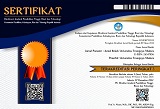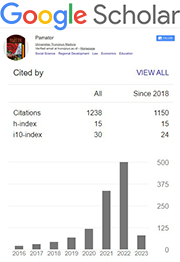ANALYSIS OF SUSTAINABLE BUSINESS MODEL DEVELOPMENT IN MSMES WITH THE MAQASHID SHARIA APPROACH IN KUALUH HULU DISTRICT, NORTH LABUHANBATU REGENCY
Abstract
This study aims to analyze the development of sustainable business models in Micro, Small, and Medium Enterprises (MSMEs) in Kualuh Hulu District, North Labuhanbatu Regency, using the Maqashid Sharia approach. Maqashid Sharia, as a conceptual framework in Islamic law, focuses on five main goals: safeguarding religion, soul, intellect, heredity, and property. This research uses a qualitative method. The results of the study show that most MSMEs in Kualuh Hulu have not fully implemented sustainability principles in their business operations. The analysis further identifies several inhibiting and driving factors in the implementation of sustainable business models that are in accordance with Maqashid Sharia. Hindering factors include a lack of knowledge and resources, while driving factors include community support and positive market potential for halal and environmentally friendly products. This study suggests several strategies to develop sustainable business models for MSMEs based on Maqashid Sharia, such as capacity building through training and mentoring, strengthening sharia-oriented business networks, and developing products and services that meet sustainability and sharia standards. Thus, it is hoped that MSMEs in Kualuh Hulu District can increase competitiveness while contributing to sustainable economic development and in accordance with Islamic principles.
Keywords
Full Text:
PDFReferences
Abdurrahman Misno. (2020)। Panorama Maqashid Syariah. Indonesian Science Media.
Acai Sudirman. (2022). Business Sustainability. Indonesian Science Media.
Ahmad, Z., and N. I. (2023). Digital marketing strategies in increasing the competitiveness of Micro, Small, and Medium Enterprises (MSMEs) in the digital era. Journal of Marketing Management, 2, 45.
Ali Mutakin. (2019). The Theory Of Maqâshid Al Syarî’ah And The Relation With Istinbath Method. Kanun Jurnal Ilmu Hukum, 19.
Ali Muttakin. (2017). Maqashid Al Shari'ah Theory and Its Relationship with the Legal Istinbath Method. Journal of Islamic Law, 6.
asrul. (2020). Analysis of Employee Supervision at the Office of the Central Statistics Agency (BPS). Journal of Islamic Economics and Business, 2.
Atika, A. (2023). The contribution of Micro, Small, and Medium Enterprises (MSMEs) to the welfare of the large community from an Islamic economic perspective. Journal of Library and Information Science, 2, 312.
Bayu, E.K., & Novita, N. (2022). Analysis of Sustainable Finance Disclosure and Banking Green Financing in Indonesia. Journal of Finance and Banking, 2.
Berliandika, B., Isfianadewi, D., & Priyono, A. (2022). Sustainable business model innovation strategy in the digital fashion industry illustration. Journal of Economics and Business, 1.
Dewi, K. A., and I. T. (2021). Social Media Marketing Strategies in Increasing MSME Sales. Journal of Marketing and Marketing Communication, 1, 35.
Febriyantoro, Mohamad Trio, and D. A. (2020). The use of digital marketing for micro, small and medium enterprises in the era of the ASEAN Economic Community. Journal of Dewantara Management, 1.
Halim.A. (2020). The Influence of Micro, Small and Medium Business Growth on the Economic Growth of Mamuju Regency. Scientific Journal of Development Economics, 3.
Harahap, R. A. (2021). MSME Digitalization Pocket Book. Book.
Imani, S. (2029). Analysis of the Welfare of Maqashid Sharia on Micro, Small and Medium Enterprises. Journal of the Finance and Banking Council, 4, 55.
Iseng, M. (2019). Contextualization of Maqashid Shari'ah in Sustainable Development Goals. Iqtisad: Reconstruction of Justice and Welfare in Indonesia, 6.
Isono, S. & H. (2020). Small Business Development. Akatiga Foundation.
Jaelani, A. (2019). Maqashid sharia and sustainable entrepreneurship development in Indonesia. Journal of Finance and Banking.
Lathifah Hanim. (2018). MSMEs and Their Business Forms. Unissula Press.
Luthfi Ahsanudin. (2022). The Formulation of Maqashid Sharia and Its Relevance to the Problems of Contemporary Fiqh Muamalah in Indonesia (Case Study of Abdullah Bin Bayyah's Thought). TASAMUH Journal: Media for the Development of Islamic Sciences, 3.
Empress Julian. (2022). Ibn Assyria's Thoughts on Maqashid Sharia in Contemporary Economics. Journal of Islamic Law, 3, 89.
Murni Sofiah, N. A. B. R. (2023). Analysis of the influence of the 4p marketing mix (product, price, promotion, and place) on purchasing decisions in micro, small and medium enterprises (MSMEs). Journal of Economic and Business Research, 2.
Nurfaizah. (2023). Analysis of the Strategy of Baznas Bengkulu Province in an Effort to Maintain the Existence of MSMEs with the Maqashid Sharia Approach. Journal of Sharia Economics and Banking, 4.
Pramana, D., & Indrarini, R. (2020). Bpr Sharia Financing in Improving the Welfare of MSMEs: Based on Maqashid Sharia. Journal of Islamic Economics and Business, 3, 46.
Salim and Syahrum. (2015). Qualitative Research Methodology. Citapustaka Media.
Silviyah, N. M., & Lestari, N. D. (2022). The Influence of Islamic Business Ethics in Improving MSMEs. 1, 112.
Sugiyono. (2014). Quantitative, Qualitative and R&D Research Methods. Alphabeta.
Suwartini. (2021). The Number of Entrepreneurs in Indonesia Reaches 8 Million Souls. Journal of Sharia Economics and Banking, 3.
Suyadi. (2018). Analysis of the Development of Micro, Small and Medium Enterprises (MSMEs) in Bengkalis-Riau Regency. KIAT Economic Journal, 29.
Wahyuni, E. et al. (2019). The Nexus of Micro, Small, and Medium Enterprises (MSMEs) Issues and Policy Controversy. Bitra Indonesia.
Wijaya, A. (2021). The Role of SMEs in Employment Generation and Economic Development in Indonesia. Journal of Small Business and Entrepreneurship Development, 12, 45.
Wijaya, K. (2019). Analysis of Small Business Empowerment (Think Tank). Young Entrepreneur Library.
DOI: https://doi.org/10.21107/pamator.v17i3.26588
Refbacks
- There are currently no refbacks.
Copyright (c) 2024 Fitri Adinda Pasaribu, Sri Ramadani, Muhammad Ikhsan Harahap

This work is licensed under a Creative Commons Attribution-ShareAlike 4.0 International License.
Jurnal Pamator : Jurnal Ilmiah Universitas Trunojoyo by Universitas Trunojoyo Madura is licensed under a Creative Commons Attribution-ShareAlike 4.0 International License.















.png)